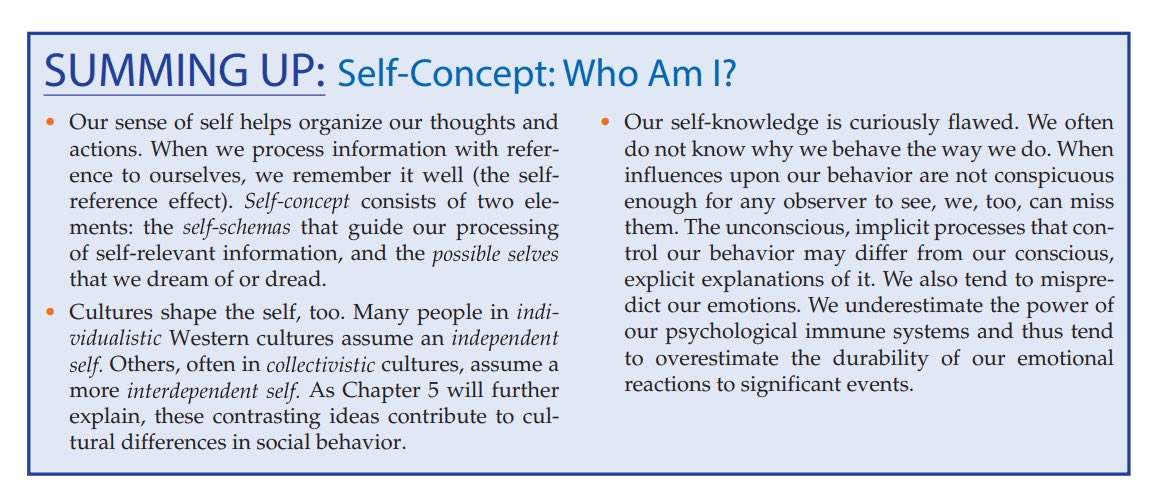#100daysoflearning #psychology
Day 18 update
Completed reading from Robert Cialdini
Started another reading from chapter 2 of Mayer’s book on Social Psychology, completed 5 pages
Day 18 update
Completed reading from Robert Cialdini
Started another reading from chapter 2 of Mayer’s book on Social Psychology, completed 5 pages
#100daysoflearning #psychology
Day 18 update
Key Learning
- spotlight effect is experienced when we think people are paying more attention to us then needed.
- we also suffer from illusion of transparency that our emotions are easily detectable.
Day 18 update
Key Learning
- spotlight effect is experienced when we think people are paying more attention to us then needed.
- we also suffer from illusion of transparency that our emotions are easily detectable.
#100daysoflearning #psychology
Day 19-20 update
Completed up to page 12/chapter 2 from Social psychology book by Mayers
Key Learning
- We overestimate the visibility of our social blunders and public mental slipups
- At center of our world is our sense of self
Day 19-20 update
Completed up to page 12/chapter 2 from Social psychology book by Mayers
Key Learning
- We overestimate the visibility of our social blunders and public mental slipups
- At center of our world is our sense of self
#100daysoflearning #psychology
Day 19-20 update
Key Learning
- Self Schema is our mental templates with which we understand and organise our world.
- The roles we play, social identities we have, comparison and surrounding culture develops our social self
Day 19-20 update
Key Learning
- Self Schema is our mental templates with which we understand and organise our world.
- The roles we play, social identities we have, comparison and surrounding culture develops our social self
#100daysoflearning #psychology
Day 21-22 update
Completed up to page 21 in reading from chapter 2 of book social psychology by Mayer’s
Interesting self concept which explored an insightful question, who am I?
Day 21-22 update
Completed up to page 21 in reading from chapter 2 of book social psychology by Mayer’s
Interesting self concept which explored an insightful question, who am I?

#100daysoflearning #psychology
Day 23-27 update
Completed up lesson 3.3 of course (involved 40 minute documentary on Millgram experiment)
Key Learning
- Obedience to authority is an universal phenomena and good people by abiding to authority can carry out wrong tasks
Day 23-27 update
Completed up lesson 3.3 of course (involved 40 minute documentary on Millgram experiment)
Key Learning
- Obedience to authority is an universal phenomena and good people by abiding to authority can carry out wrong tasks
#100daysoflearning #psychology
Day 23-27 update
Key Learning
- Conformity is another form of obidience when an individual is pressurised to do an ac activity because group is doing it. (It is hard to fight heard mentality)
Day 23-27 update
Key Learning
- Conformity is another form of obidience when an individual is pressurised to do an ac activity because group is doing it. (It is hard to fight heard mentality)
#100daysoflearning #psychology
D28, D28, D30 update
Completed week 3 videos. Including 2 documentaries on Stanley Millgram obidience and Philip zimbardos Stanford prison experiment.
D28, D28, D30 update
Completed week 3 videos. Including 2 documentaries on Stanley Millgram obidience and Philip zimbardos Stanford prison experiment.
#100daysoflearning #psychology
D28, D28, D30 update
Key Learning
- Do not discount power of situation as sometimes it can lead to actions we are not proud of
- Generally people are good but when their identity is taken out the dark side comes out (annonimity, deindividualization)
D28, D28, D30 update
Key Learning
- Do not discount power of situation as sometimes it can lead to actions we are not proud of
- Generally people are good but when their identity is taken out the dark side comes out (annonimity, deindividualization)
#100daysoflearning #psychology
D31 update
Completed up to lesson 4.1 and also seen documentary on Abeline paradox
Key Learning
- We as a group do some activities even though none of the group members are really in favor of it.
- Abeline paradox is observed everywhere
D31 update
Completed up to lesson 4.1 and also seen documentary on Abeline paradox
Key Learning
- We as a group do some activities even though none of the group members are really in favor of it.
- Abeline paradox is observed everywhere
#100daysoflearning #psychology
D32-33 update
Completed peer graded assignment from week3 and in week 4 completed up to Lecture 4.2
Key Learning
- We have used categories to make meaning of world around us and they are linguistic devices
D32-33 update
Completed peer graded assignment from week3 and in week 4 completed up to Lecture 4.2
Key Learning
- We have used categories to make meaning of world around us and they are linguistic devices
#100daysoflearning #psychology
D32-33 update
Key Learning
- Categorical thinking gives rise to prejudice
- In real-world everything is a continuum rather than discrete categories
D32-33 update
Key Learning
- Categorical thinking gives rise to prejudice
- In real-world everything is a continuum rather than discrete categories
#100daysoflearning #psychology I could not continue on this one. I would love to restart this after some time.
• • •
Missing some Tweet in this thread? You can try to
force a refresh





